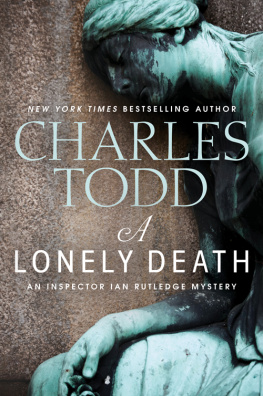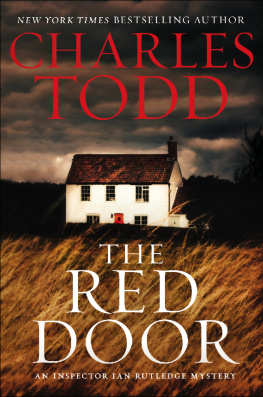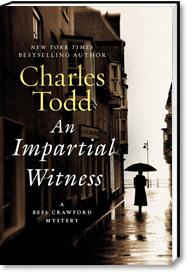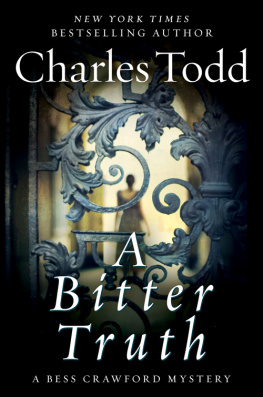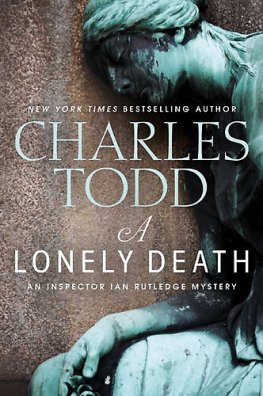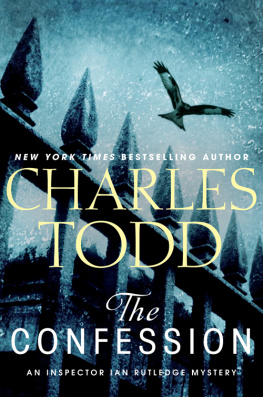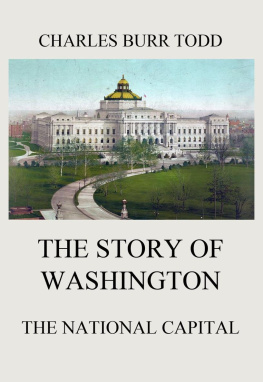Charles Todd - A long shadow
Here you can read online Charles Todd - A long shadow full text of the book (entire story) in english for free. Download pdf and epub, get meaning, cover and reviews about this ebook. genre: Detective and thriller. Description of the work, (preface) as well as reviews are available. Best literature library LitArk.com created for fans of good reading and offers a wide selection of genres:
Romance novel
Science fiction
Adventure
Detective
Science
History
Home and family
Prose
Art
Politics
Computer
Non-fiction
Religion
Business
Children
Humor
Choose a favorite category and find really read worthwhile books. Enjoy immersion in the world of imagination, feel the emotions of the characters or learn something new for yourself, make an fascinating discovery.

- Book:A long shadow
- Author:
- Genre:
- Rating:5 / 5
- Favourites:Add to favourites
- Your mark:
- 100
- 1
- 2
- 3
- 4
- 5
A long shadow: summary, description and annotation
We offer to read an annotation, description, summary or preface (depends on what the author of the book "A long shadow" wrote himself). If you haven't found the necessary information about the book — write in the comments, we will try to find it.
A long shadow — read online for free the complete book (whole text) full work
Below is the text of the book, divided by pages. System saving the place of the last page read, allows you to conveniently read the book "A long shadow" online for free, without having to search again every time where you left off. Put a bookmark, and you can go to the page where you finished reading at any time.
Font size:
Interval:
Bookmark:
Charles Todd
A long shadow
Dudlington, 1919
1
Constable Hensley walked quietly through Frith's Wood, looking left and right for some sign that others had been here before him. But the wet, matted leaves showed him nothing, and the cold sun, slanting through bare trees, was more primitive than comforting. It would be dark soon enough. The light never lasted this time of year, unlike the gloriously bright evenings of summer, when it seemed to linger as if unaware of dusk creeping toward it. He came to the end of the wood and turned to retrace his steps to the small clearing where he'd left his bicycle. Halfway there, he could have sworn he heard someone moving behind him, a soft step barely audible. But his ears were attuned to the lightest sound. Wheeling about, he scanned the trees around him, but there was no one to be seen through the tangle of undergrowth and trunks. No one living
Imagination, he told himself. Nerves, a small voice in his head countered, and he shivered in spite of himself.
After a moment he went hurrying on, not looking back again until he'd retrieved his bicycle and mounted it. Then he scanned Frith's Wood a final time, wondering how a place so small could appear to be so gloomy and somehow threatening, even in winter.
The Saxons, so it was said, had beheaded men here once, long ago. Taking no prisoners, unwilling to be hindered by captives, they'd come only for booty, and nothing else. Not slaves, not land or farms, just gold or silver or whatever else could be bartered at home. A greedy people, he thought, giving his bicycle a little push to start it forward. Greedy and bloody, by all accounts. But nearly fifteen hundred years later, the name of the wood hadn't changed. And no one cared to set foot there after dark.
He was glad to be out of it.
Yet he could still feel someone watching him, someone on the edge of the wood, someone without substance or reality. Dead men, most likely. Or their ghosts.
One ghost.
He didn't look again until he'd reached the main road. Out of the fields, away from the wood, he felt safer. Now he could pedal back the way he'd come, make the turning at The Oaks, and sweep down into Dudlington. Anyone seeing him would think he'd been at the pub, or sent for from Letherington. He'd been clever, covering his tracks. It made sense to plan ahead and not go rushing about. If he had to go there.
Of course a really clever man, he told himself, would stay away altogether.
The way behind him was still empty.
2
London, New Year's Eve, 1919
Frances was saying as their cab dropped them in Marlborough Square, "Maryanne will be so happy to see you. It will do her good!"
"Yes, well, don't expect me to play bridge," Rutledge answered her, half in jest, half in earnest. He had worked for the past hour to convince her that he was in good spirits. She had always been too quick to read shadows on his face. "You haven't forgot the last time, have you? At the Moores'? I was partnered by that awful woman, what was her name? Stillwell? She dissected every hand ad nau- seum. Put me off bridge for the better part of a year!"
In the square behind them he heard the gate creak as someone came out of the garden and walked briskly away. The policeman in him noted the fact as the footfalls stopped, another gate down the street opened and shut, and there was silence once more.
"You don't bring in the new year playing bridge, silly! Besides, you ought to know Maryanne doesn't care for card games," his sister informed him, walking up the steps to the door of Number 18. She glanced up at him, thinking how handsome he was in his evening dress, his dark hair and dark eyes a sharp contrast with the gleaming white shirtfront. Too bad she couldn't persuade him to wear it more often he'd become reclusive since the war. Was Jean's shadow still hanging over him? She didn't want to believe it was France. Or shell shock lingering He refused to talk about himself, however hard she probed. And Dr. Fleming was as tight-lipped as her brother. "Maryanne said something about an entertainment-probably a new soprano" Mischief danced in her eyes as she waited for his reaction.
"Good God! That was at the Porters', just before the war. She was Austrian and made the chandeliers quake."
"Now that's an outright lie, Ian! She was Italian!" Frances's laughter was silvery in the cold air, her breath a frosty puff. "She insisted you take her in to supper and then spent the rest of the evening trying to persuade you to visit her in Venice!" She lifted the knocker and then added, "Jean was in a terrible huff. She was left with that colonel, the one with-"
The door opened, and Maryanne Browning enveloped Frances in a warm embrace. "Hallo, my dear, I'm so glad you could come! And Ian-you've been a stranger far too long. Give your coats to Iris, here, and join us in the drawing room!"
She swept them with her, made introductions, settled them with drinks, and sat down herself to resume a conversation about Canada, which their arrival had interrupted.
Rutledge knew most of the people there. Simon, Maryanne's brother, vicar at a country church in Sussex. Dr. Philip Gavin, a Harley Street surgeon, and his wife, who had been friends with Maryanne for years. A younger couple, the man missing an arm from the war, were the Talbots, George and Sally. Rutledge had met them at one of his sister's parties. Across from him sat a naval officer, Commander Farnum, and his wife, Becky, who lived just down the road from Frances. The last guest was a dark- haired woman of infinite poise, whose eyes were turned on him as if she could read his thoughts. The intensity of her gaze made him uncomfortable. Her name was Mrs. Chan- ning, and she was new to him.
Maryanne's husband, Peter Browning, had died in the influenza epidemic of 1918. A civil servant in the war ministry, he had appeared well at seven in the morning as he kissed his wife good-bye. At three o'clock, he dropped dead at his desk, overwhelmed by swift, massive infection. A silver frame on the mantel held his photograph: a thin-faced man with kind eyes. Rutledge had liked him immensely.
The evening passed with pleasant conversation, and Rutledge found himself relaxing, the voice in his head silent for now, the company interesting enough to draw his attention away from his own thoughts. They had been bleak enough, lines from the letters lying on his desk still echoing in his mind. He was glad to escape them, if only for an hour or so.
Mrs. Channing, sitting across the room from him, made no effort to charm her fellow guests, and yet she seemed to become the heart of the party, her voice never dominating but often bringing laughter with a well-timed comment.
He found himself wondering what her age was-closer to his than Frances's, he decided. Or perhaps younger than both of them, it was hard to tell, because she seldom spoke of herself or of her late husband, as if too private a person to thrust her experiences on strangers. There were no benchmarks
An attractive woman, most certainly, with what Frances would call good cheekbones, her dark hair touched with gold under the soft spill of light from the sconce behind her, her extraordinary poise intriguing, her laugh pleasing.
Rutledge's deep dread of watching his soul stripped naked in public-the abiding fear of someone discovering the guilt he carried with him, the horrors of shell shock, the voice of a dead man he heard as clearly as his own- faded. The policeman in him was lulled as well, and any misgivings he'd felt when introduced to her had vanished.
All the same, he was glad to be seated down the table from Mrs. Channing, his hostess on his right and Mrs. Tal- bot on his left.
Dinner was nearly up to prewar standards.
Font size:
Interval:
Bookmark:
Similar books «A long shadow»
Look at similar books to A long shadow. We have selected literature similar in name and meaning in the hope of providing readers with more options to find new, interesting, not yet read works.
Discussion, reviews of the book A long shadow and just readers' own opinions. Leave your comments, write what you think about the work, its meaning or the main characters. Specify what exactly you liked and what you didn't like, and why you think so.

